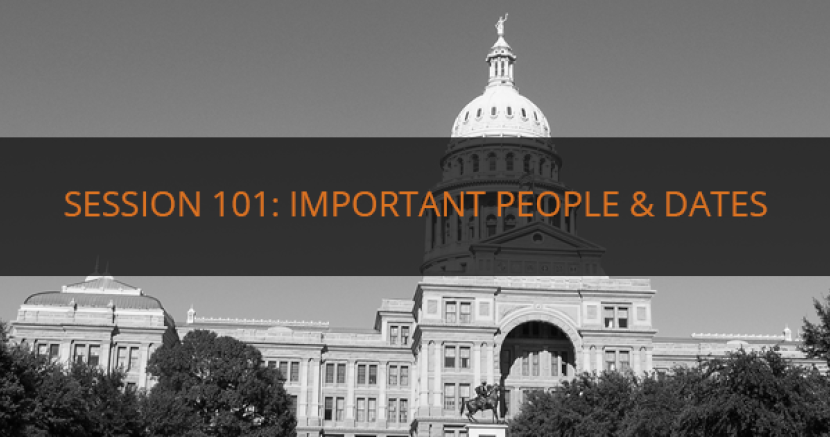As the 84th Texas Legislature convenes in Austin, it’s not just lawmakers that will be swarming the halls of the Capitol. There is a large, robust community that works throughout the Capitol – thousands of people make state government work (or not work) on a daily basis.
Here is a primer on who comes to the Capitol, and a rough sketch of what we expect them to be doing while they are here.
The People of the Legislature
Legislators – All told, 181 legislators fill the chambers of the Capitol every year – 31 Senators, and 150 Representatives. Senators are elected to four-year terms, with half running in presidential-year elections (2012, 2016, 2020) and half running in state-year elections (2010, 2014, 2018). All 150 members of the House go up for re-election every two years.
Presiding Officers – Both the Senate and the House have a presiding officer, or leader of the chamber, that oversees the business of each chamber (more on each position in a future post). The leader of the Senate is the Lieutenant Governor, an elected statewide position currently held by Republican Dan Patrick of Houston. The leader of the House is the Speaker of the House, who is elected by the members of the Texas House on the first day of the Legislature. Since 2009, Republican Joe Straus of San Antonio has served as Speaker of the House. Both the Lieutenant Governor and Speaker of the House have a robust staff to assist them with their duties.
Capitol Staffers – Every legislator has staff members to help fulfill the duties of the office. Positions include Chief of Staff, Legislative Director, Policy Director, General Counsel, Committee Clerk, Staff Assistant, and, of course, Interns. Since Senators represent more people than House members, their offices are larger and they hire more people. If forced to estimate, I’d say there are approximately 1,110 Capitol staffers that are part of the Capitol community.
Employees of the Capitol – Both the Texas Senate and Texas House directly employ a relatively small but vitally important number of people to help carry out the functions of each chamber. Parliamentarians help interpret and explains rules of each chamber. Bill clerks handle the official filing, reading, and recording of all details regarding the passing of legislation. Security officers and sergeants help maintain order in each chambers. Since members of the public aren’t allowed on the floor of the Senate or House while they meet, each chamber has messengers that will run notes, bill packets, and sometimes even food to members on and off the floor, as well as assist with a number of other important duties. Cooks in the Capitol Kitchen, housekeeping and janitorial staff, mail room workers, tour guides, and gift shop employees round out a group of underappreciated yet vitally important group of capitol employees.
Lobbyists – A lobbyist is a person that works on behalf of an interest group, organization, or business to impact change in government. A lobbyist can be someone who only works on a single issue, or someone who contracts with multiple clients to cover a range of issues. (We’ll have a post in the future that goes into more detail about lobbying). According to Texans for Public Justice, there were 1,663 lobbyists registered in late May 2013, the last time the Legislature was convened for a Regular Session.
Press – Every year, dozens of members of the press get media credentials from the Senate and House to cover the Legislative process. The press are the only people allowed on the floor of each chamber (other than legislators and approved employees of the Legislature), and will, on their best days, serve as watchdogs for the public.
Government Relations – The last but crucial group of people that make up part of the Texas Capitol community are government relations staffers. Each of Texas’ state agencies needs to work with legislatures to get their work completed. Whether it is members of the governor’s staff, or budget writers with the Legislative Budget Board, or health policy specialists with one of Texas’ health care state agencies, these lobbyists of the state play a crucial role in shaping the public policy process in the Legislature.
Calendar
The official “Regular Session” of the Legislature began on Tuesday, January 13, 2015, and continues until Monday, June 1, 2015. The following is a calendar – with some specific days, and some rough timelines based on my prior experience – of what to expect during the next five months.
- January 13 – First day of session; legislators sworn in; House chooses Speaker of the House
- January 13 to 16 – House will convene and adopt rules for session in the first week
- January 20 – Inauguration Day
- January 21 – Senate adopts rules for session
- Late January – Committee assignments announced in the House and Senate, bills that members have filed start to be referred to their appropriate committees
- Late January – Budget hearings begin
- Early February – Committees begin hearing testimony; most committees with a hearing to lay out scope of the work for the coming months by gathering testimony from state agencies that are affiliate with the committee’s work
- Mid-February – The governor can name “emergency items” that can be taken up early by the House and Senate. The governor normally declares those items by the end of January, and each chamber will take the issues up and consider them on the floor as soon as possible, usually by the middle of February. Past “emergency items” have included voter ID legislation, sanctuary city legislation, and abortion bills – former Governor Perry usually identified strong conservative issues as “emergency items” each legislative session.
- Late Feb / Early March – Start to have major bills heard in committee hearings
- March 13 – Last day to file bills
- Mid-March – Committees ramp up their meetings
- Last week of March – The budget usually comes to the floor
- Month of April – Committees are very active hearing and passing bills, and legislation starts to come to the floor of each chamber for debate. Each chamber may go from hearing a handful of bills a day at the start of the month to dozens of bills a day by the end of the month.
- Early May – The chambers will start to meet on weekends to get all their work complete.
- Mid May – Major work starts to wrap up, as legislators finalize bills, meet to settle differences between the Senate and House on what should be in each bill, and close the committees for the session.
- Late May – The budget is complete and gets a final vote. By now, we’ll know if there will need to be a special session – another 30 days – to finish any outstanding work.
- June 1 – Last day of regular session
DONATE
Your donation supports our media and helps us keep it free of ads and paywalls.









